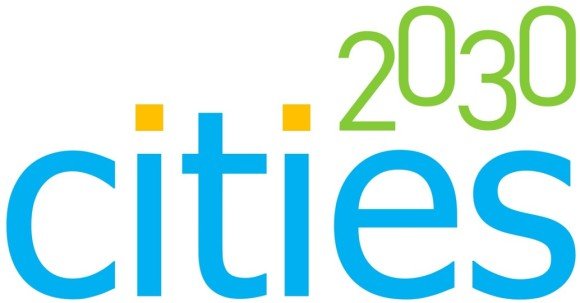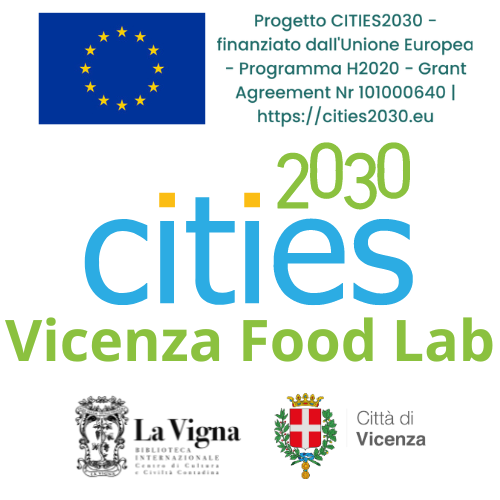- (1) Welcome to Vicenza!
- (2) The Municipality of Vicenza
- (3) The International Library "La Vigna"
- (4) Policy Lab: general overview
- (5) Policy Lab: thematic priorities
- (6) Policy lab: Action Plan
- (7) PassaVIvande: participatory process for the local Food Policy
- (8) Living Lab: Innovation Action Plan
- (9) Stories from the lab: LL#2 - FOOD ACTION: Sustainable Ethnic Dinners
- (10) Stories from the lab: main events (2021-2022)
- (10) Stories from the lab: main events (2023)
- (10) Stories from the lab: main events (2024)
- (10) Stories from the lab: main events (2024) (2)
- (10) Stories from the lab: main events (2024) (3)
- (11) Cities2030 Vicenza Food Lab and its CRFS: the collaboration with IPA Risorgive
- (12) UN Food System Dialogue in Vicenza
- Access history
- Members
- Lab Festival

(3) The International Library "La Vigna"
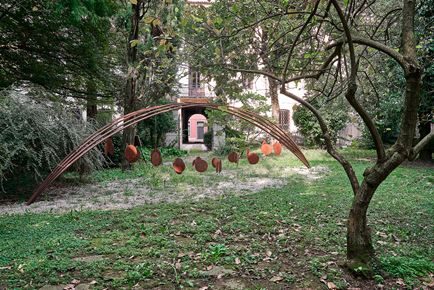
The Living Lab La Vigna, named “The Ortobook”, is a place where stakeholders cooperate to improve knowledge about CRFS and ecosystem, to share thoughts and ideas to co define a path towards innovation in the CRFS and where initiatives to raise awareness of consumers towards more sustainable choices. It is also a place where experts meet and promote trainings events for both food relevant stakeholders, potential start-uppers, and general public.
The Ortobook is a place where it is possible to cultivate knowledge and prompt the culture of open innovation to improve urban and region food system.
The International Library is an Institute of documentation specialized in agricultural and rural world culture studies. It was founded 40 years ago thanks to the successful intuition of Demetrio Zaccaria, an entrepreneur from Vicenza who got fond of collecting books about viticulture, agriculture and enology in the 1950s.
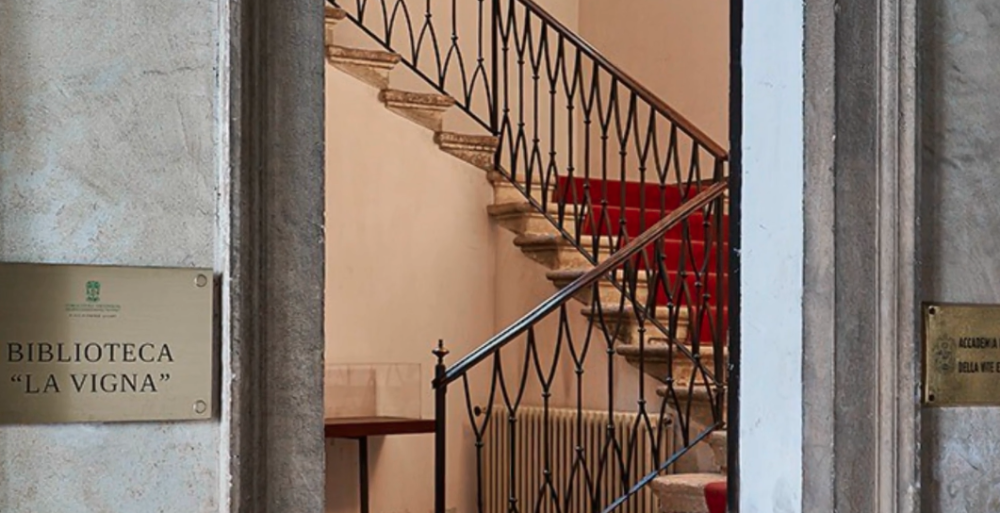 The Library conserves more than 62.000 books (some of them dated back to ‘400) on food, wine and agriculture. It represents a real-life LIVING LAB where citizens meet researchers, where knowledge is preserved and developed to prompt open thinking and establish an open innovation environment. Here researchers, entrepreneurs and citizens meet to share knowledge and increase skills to develop a more sustainable food ecosystem. The Library is currently managing agricultural and food business archives, to promote awareness and knowledge events about food sustainability, history, and healthy diet and nutrition; among the most interesting project that La Vigna is developing we find:
The Library conserves more than 62.000 books (some of them dated back to ‘400) on food, wine and agriculture. It represents a real-life LIVING LAB where citizens meet researchers, where knowledge is preserved and developed to prompt open thinking and establish an open innovation environment. Here researchers, entrepreneurs and citizens meet to share knowledge and increase skills to develop a more sustainable food ecosystem. The Library is currently managing agricultural and food business archives, to promote awareness and knowledge events about food sustainability, history, and healthy diet and nutrition; among the most interesting project that La Vigna is developing we find:
- the promotion of capacity building and training activities;
- the onboarding of international member, companies and organizations to co create and share new knowledge in the field of Food system;
- the systematization of several archives and in particular the archive of seeds coming from the Institute of Genetics and Agricultural Experimentation "N. Strampelli”.
This last initiative is of huge value in the prospect to enable innovation in the food arena. Since its foundation has operated in the field of genetic improvement of various agricultural species, in particular constituting some vitreous grain hybrids of corn, such as Italo 225 and Italo 270 (Italy - Lonigo) and numerous varieties of soft wheat such as Lucciola, Leopardo, Lampo, Lontra, Libellula (variety of the "L" - Lonigo series). The latter have been cultivated since the 1960s throughout the country, in Eastern European countries and in China, over a total area of over a few million hectares over the years. The Institute has taken steps to preserve some of the most widespread populations and old varieties of corn and soft wheat present in the Veneto Region, setting up a Germplasm Bank dedicated to cereals, among the most important at national level. La Vigna considers these initiatives important, as they have the potential to enhance some of the most strongly rooted typical productions in our territory, while ensuring the conservation in the environment of selection and adaptation, of a genetic diversity that must be considered, in all respects, a "common heritage" to be preserved for future generations.
We, at La Vigna, are convinced that knowledge can lead innovation, that tradition and history can inspire new sustainable solutions in the food sector: this is the reason why our commitment means preserving and promoting know-hows, studies, and research in the food sector and speaking to the next generation.
The LL will be promoted towards CRFS interested parties, as here they can exploit knowledge about food history, food traditions, technologies and CRFS good practices, they can meet experts and find cutting-edge advises to generate new values for food sustainability.
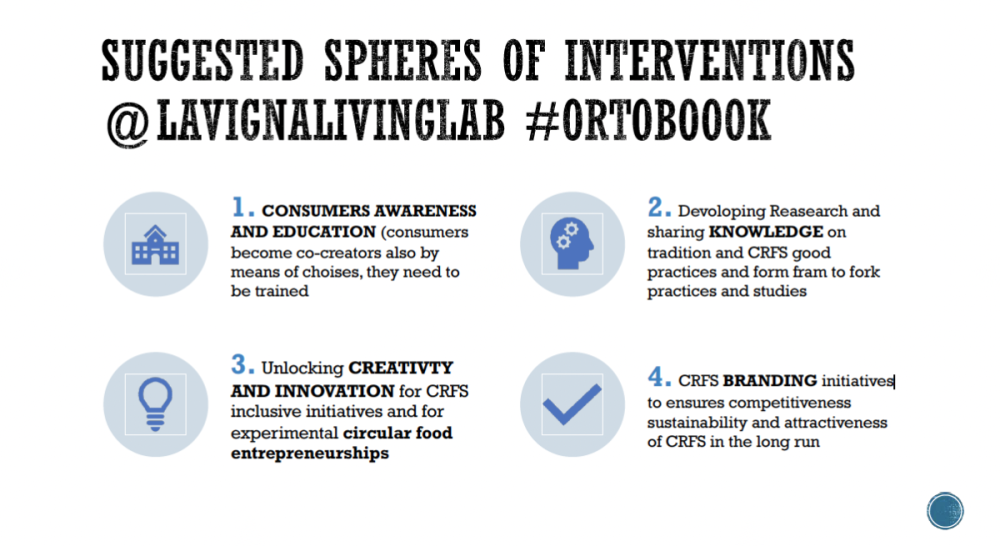 The preliminary suggested SPHERES of intervention of the ortobook LL, as detected during the first meetings of the operative core team were:
The preliminary suggested SPHERES of intervention of the ortobook LL, as detected during the first meetings of the operative core team were:
CONSUMERS AWARENESS AND EDUCATION
Developing Research and sharing KNOWLEDGE
Unlocking CREATIVTY AND INNOVATION
CRFS BRANDING initiatives
Proposed Activities for the SPHERE 1
Aperilabs with testimonials (cooks, producers, designers) for awareness raising of both producres and consumers
Initiatives for Consumers Education: workshops, seminars, food experiences…
Food for placemaking experiment (un orto educativo/dimostrativo @ La Vigna; lavigna in città)
Suggested topics: from farm to fork, food and health, food and climate change, tradition and biodiversity conservation, awareness that consumer choice impact on Food Systems, on Climate Change and on biodiversity, organic for health, sustainable lifestyle for the health of environment and communities
Proposed Activities for the SPHERE 2
Call for Papers for La Vigna magazine
Public Events to share Knowledge on Tradition
Public Events to promote innovative practices and tools in the Food System Arena
Proposed Activities for the SPHERE 3
World Cafe events to discuss and share innovative solutions in the CRFS in collaboration with the SmartCulTour Project
Designing (and testing) a new concept of Urban shared Garden (orto urbano) or demonstrative urban garden for the cultivation of ancient grains
Proposed Activities for the SPHERE 4
Applying for Creative City of Gastronomy, in collaboration with the SmartCulTour Project, with the Municipality of Vicenza
Supporting City of Vicenza and other Veneto Cities to sign the Milano Urban Food Pact
Stimulating other Veneto Cities to enter the CITIES 2030 Alliance network
All the above mentioned activities should be considered as the outcome suggested during the first rounds of brainstorming (they are not yet validated neither included in the action plan).
The development of the Living Lab the ortobook will follow the scheme below:
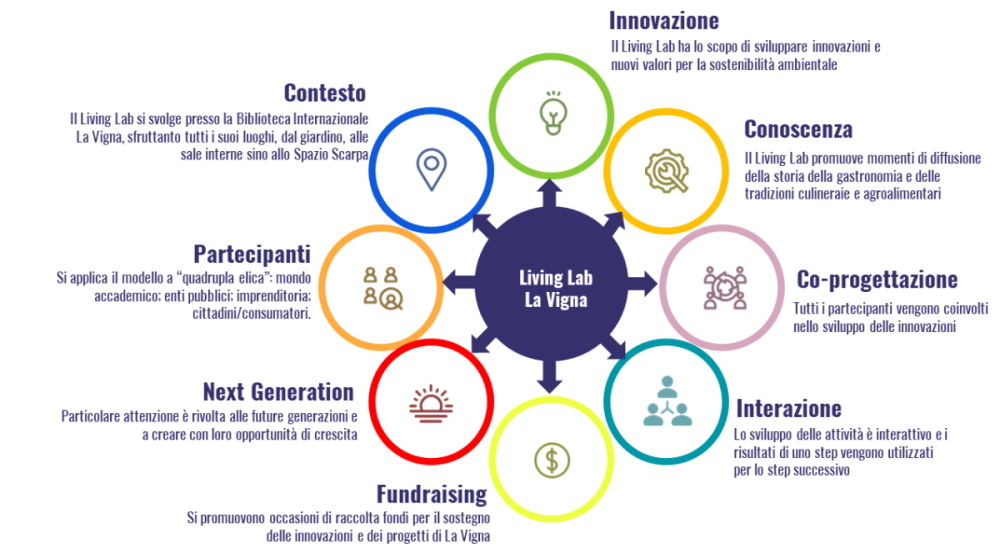 Innovation: the LL La Vigna aim to develop innovations and new values for environmental sustainability
Innovation: the LL La Vigna aim to develop innovations and new values for environmental sustainability
Knowledge: the LL La Vigna promotes moments of dissemination of the history of gastronomy and culinary and agronomic traditions
Co-design: all participants will be involved in the development of innovations
Interaction: the development of activities is interactive and the results of one step will be use in the following step
Fundraising: opportunities to raise funds will be promoted for the innovations and experiments of La Vigna
Next Generation: particular attention is paid to future generations to co-create growth opportunities
Participants: the quadruple helix model is applied: academia, public bodies, entrepreneurship and civil society
Contest: the living lab takes place at the La Vigna International Library using all its spaces, from the garden to the internal rooms and the “Spazio Scarpa”.
CLICK HERE TO SEE THE GAG: Journal of Agriculture and Gastronomy
